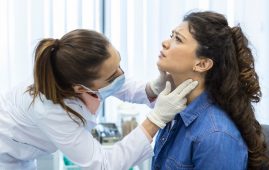

Migraine is frequently underdiagnosed and mistreated, and even when it is, it can be difficult to treat early enough and devise preventative tactics. A new study looks at techniques to more reliably anticipate when a migraine will arise, using mobile apps to assess sleep, energy, emotions, and stress, to improve the ability to prevent attacks. The findings will be published online in Neurology®, the American Academy of Neurology’s medical publication, on January 24, 2024.
The study discovered that poor subjective sleep quality, as well as a lower-than-usual quality of sleep the night before, were both related with an increased risk of migraine the following morning. A lower-than-usual energy level the day before was connected with a headache the following morning. These factors did not raise the likelihood of migraines in the afternoons or evenings. The only predictors of an afternoon or evening headache were high stress levels or above-average energy the day before.
These different patterns of predictors of morning and later-day headaches highlight the role of the circadian rhythms in headache. The findings may give us insight into the processes underlying migraine and help us improve treatment and prevention.”
Kathleen R. Merikangas, PhD, study author of the National Institute of Mental Health,
National Institutes of Health in Bethesda, Maryland
The study included 477 adults aged 7 to 84, including 291 females. Participants used a mobile app to score their mood, energy, stress, and headaches four times each day for two weeks. They also rated their sleep quality daily and wore sleep and physical activity monitors. Almost half of the individuals had a migraine history, and 59% experienced at least one morning headache attack throughout the trial.
People who reported inferior subjective sleep quality had a 22% higher risk of experiencing a headache the following morning. A drop in self-reported normal sleep quality was also linked to an 18% greater risk of a headache attack the following morning. Similarly, a reduction in the previous day’s energy level was connected with a 16% increased risk of headache the next morning. In contrast, higher average levels of stress and significantly higher energy than normal the day before were related with a 17% increased risk of headache the next afternoon or evening. After accounting for sleep, energy, and stress, neither anxious nor depressed moods were associated with headache attacks.
“Surprisingly, we found no link between a person’s anxiety and depression symptoms-; either having more symptoms or having higher-than-average levels of symptoms-;and their likelihood of having a migraine attack the next day,” Merikangas said. “Perhaps most interesting, headaches were associated with self-rated sleep quality rather than actual measures of sleep patterns. This highlights the importance of perceived physical and emotional states in the underlying causes of migraine.”
“Our study demonstrates the importance of monitoring sleep changes as a predictor of headache attacks,” said study author Tarannum M. Lateef, MD, of the Children’s National Health System in Washington, D.C. “The use of apps that track sleep and other health, behavioral and emotional states in real time can provide valuable information that can help us to manage migraine.”
One disadvantage of the study is that participants were tracked for only a short length of time.
more recommended stories
 Healthy Habits Slash Diverticulitis Risk in Half: Clinical Insights
Healthy Habits Slash Diverticulitis Risk in Half: Clinical InsightsHealthy Habits Slash Diverticulitis Risk in.
 Caffeine and SIDS: A New Prevention Theory
Caffeine and SIDS: A New Prevention TheoryFor the first time in decades,.
 Microbial Metabolites Reveal Health Insights
Microbial Metabolites Reveal Health InsightsThe human body is not just.
 Reelin and Cocaine Addiction: A Breakthrough Study
Reelin and Cocaine Addiction: A Breakthrough StudyA groundbreaking study from the University.
 Preeclampsia and Stroke Risk: Long-Term Effects
Preeclampsia and Stroke Risk: Long-Term EffectsPreeclampsia (PE) – a hypertensive disorder.
 Statins and Depression: No Added Benefit
Statins and Depression: No Added BenefitWhat Are Statins Used For? Statins.
 Azithromycin Resistance Rises After Mass Treatment
Azithromycin Resistance Rises After Mass TreatmentMass drug administration (MDA) of azithromycin.
 Generative AI in Health Campaigns: A Game-Changer
Generative AI in Health Campaigns: A Game-ChangerMass media campaigns have long been.
 Molecular Stress in Aging Neurons Explained
Molecular Stress in Aging Neurons ExplainedAs the population ages, scientists are.
 Higher BMI and Hypothyroidism Risk Study
Higher BMI and Hypothyroidism Risk StudyA major longitudinal study from Canada.

Leave a Comment